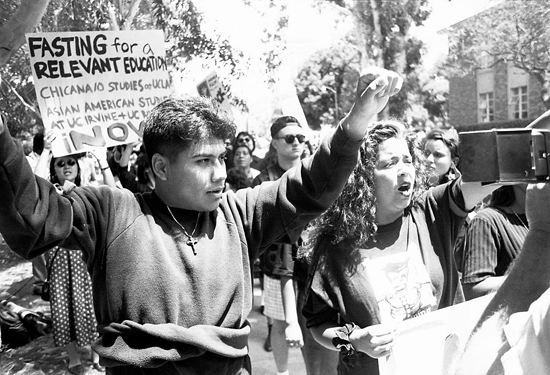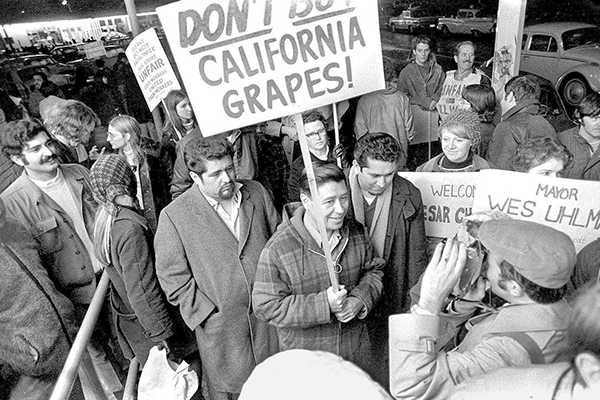
In June of 1993, the movement for equality on campus reached a dramatic conclusion. A 14-day hunger strike held by five students, one professor and three community members came to an end. A month earlier, several rallies of nearly 2,000 people filled Royce in support of the drive to create a department dedicated to Chicana and Chicano studies. At the time, there was an interdepartmental program that offered a bachelor’s degree and a specialization, but there were no permanent, full-time faculty members who taught Chicana/o studies. Demonstrators staged sit-ins, marches, and erected tent villages and shanties on campus drawing the attention of several legislators and the national media. Three weeks after the protests started, Chancellor Charles Young announced that a new interdisciplinary center for Chicana/o Studies would be created – and it would be named after Cesar Chavez.
As it has since 1995, the state of California celebrated Cesar Chavez Day on March 31, a day honoring the nation’s best-known Latino civil rights activist. The co-founder of the National Farm Workers Association (NFWA), which later became the United Farm Workers (UFW), preached non-violent civil disobedience and his leadership in the Delano (California) grape strike of 1965 marked his ascendance into national prominence.
At the time, UCLA students and faculty supported the plight of the farm workers. The Daily Bruin published ads fundraising for their movement, advertising marches and advocating for the boycott of grapes. Nearly 100-150 students marched to the Safeway in Westwood, in protest of the store’s policy of selling “scab” grapes. In 1970, the union reached a collective bargaining agreement with the table-grape growers, affecting in excess of 10,000 farm workers.

In keeping with the labor leader’s practice of nonviolent resistance, Chavez employed a month-long hunger strike in 1968. His fast came to an end after a visit from Senator Robert F. Kennedy with whom he had developed a friendship. His support for Kennedy was apparent during the senator’s presidential campaign rally in Royce Hall where Chavez was the featured speaker. Chavez again returned to speak at UCLA in 1972, educating Bruins about the ongoing struggle in the fields – and urging a boycott of non-union lettuce.
Fast forward to May 1993, a month after Chavez’ death, student activism played an important role in the growth of Chicana/o Studies at UCLA. The students and faculty undertook civil disobedience and a nonviolent hunger strike to underscore their demands for greater support of the program and the establishment of a department of Chicana and Chicano Studies. The result was the development of a new academic unit - a center for interdisciplinary instruction and six new full-time faculty positions within this unit. In 2007, both the center for interdisciplinary studies and department were merged to become the César E. Chávez Department of Chicana and Chicano Studies at UCLA. It honors the memory of his leadership for social change, fair treatment of farm workers, his support of nonviolence and his use of the hunger strike as a tool to challenge the moral conscience of the nation and the world.